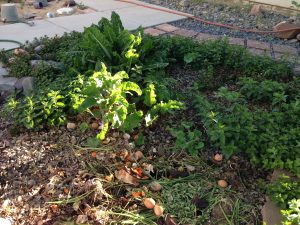 I know I just wrote about compost a few weeks ago, but I can’t help myself. The compost in our back yard has truly taken on a life of its own. The way we handle compost at home is we dig a hole and toss the scraps in. Occasionally we’ll throw some dirt on top of it and dig a new hole once that one is full. We have nine garden beds, so about every six months or so, we select a different bed and start the process over again. Over the years we’ve developed some excellent soil, thanks to this method of composting.
I know I just wrote about compost a few weeks ago, but I can’t help myself. The compost in our back yard has truly taken on a life of its own. The way we handle compost at home is we dig a hole and toss the scraps in. Occasionally we’ll throw some dirt on top of it and dig a new hole once that one is full. We have nine garden beds, so about every six months or so, we select a different bed and start the process over again. Over the years we’ve developed some excellent soil, thanks to this method of composting.
Our current pile is located where we’ve had mint growing for several years. The mint started as a potted plant a friend gave me. Every so often I have to pull it all out and start over because it’s so prolific and would take over the whole garden without being kept in check. The roots become so impacted that we just dig up the whole root system and let the remnants regenerate. With spring upon us, the mint is, of course, moving in on everything else. But it also has some curious companions in this year’s compost.
I pulled up a huge chard plant in the fall that lasted a whole year, including the summer. Its leaves were enormous and too tough to eat, so I threw the whole plant in the pile. Before long, I noticed tender dark green leaves pressing up through the layers of food scraps. Reincarnated chard! It’s currently almost as big as the plant I removed from the soil in the fall and we’ve started eating our compost chard. Along with this miracle vegetable, there are onions, potatoes, squash, and a most unusual beet. What’s unusual about it is that the greens and most of the beet itself are completely growing above the ground, with a tiny umbilical root reaching deep into the dirt. I will be watching this curious arrangement in the coming days.
So why do I keep thinking and writing about compost? For one thing, I believe in it and like promoting a process that is highly beneficial to our planet and requires only a bit of effort for excellent returns. It’s great for the soil. It reduces trash. Additionally, compost is one of my favorite metaphors. I think of compost as everyday life. Some of it nourishes us, makes us happy, helps us grow. Other parts might not seem so useful or pleasant to process. Yet, all of it is life, the things that just come up. I believe we have an opportunity to grow from everything that comes along, and sometimes the parts we may think aren’t benefitting us in the end turn out surprisingly extraordinary after all.
